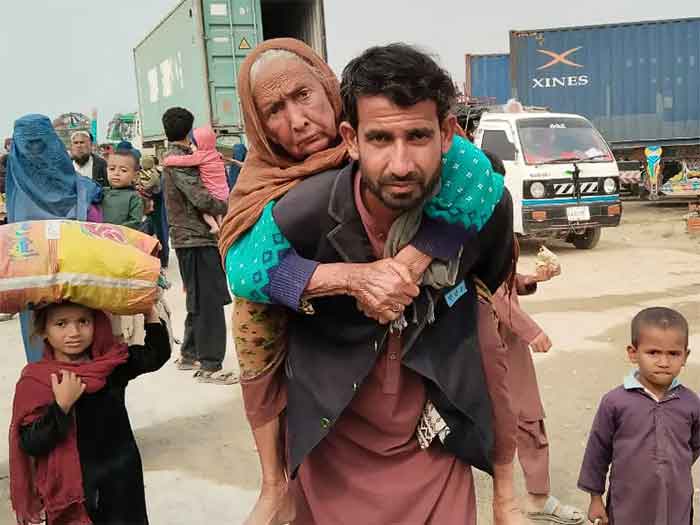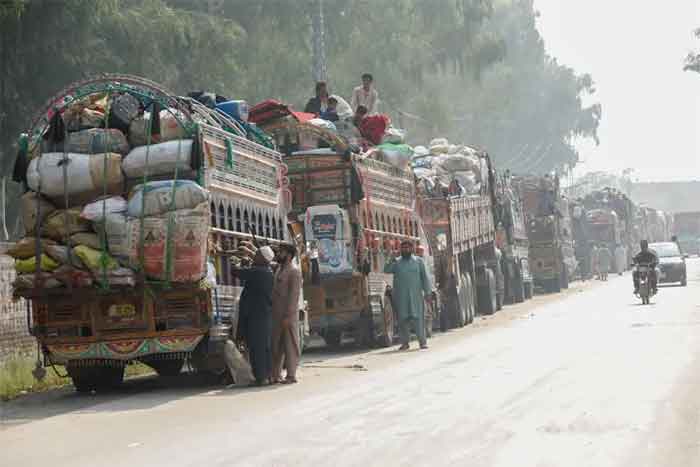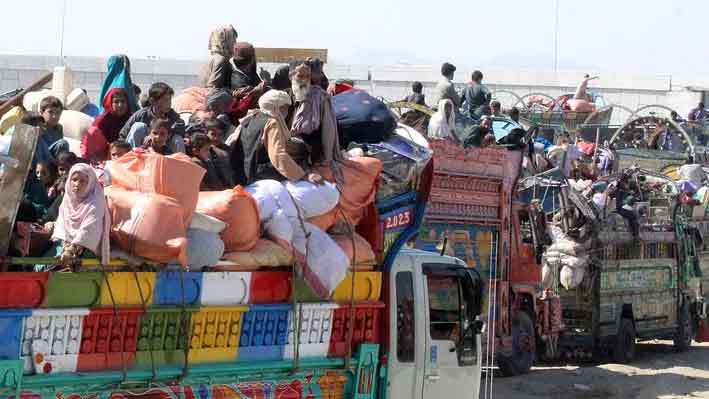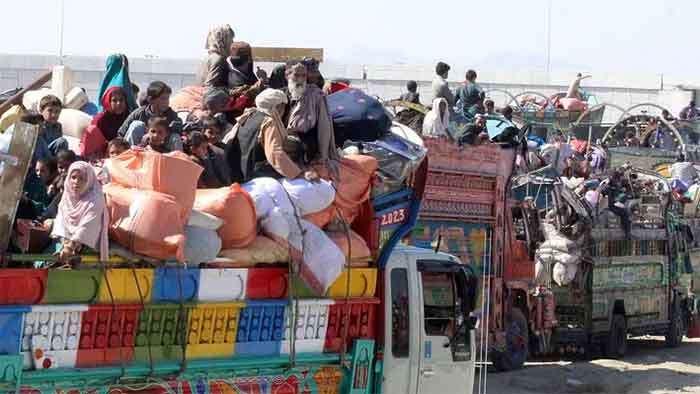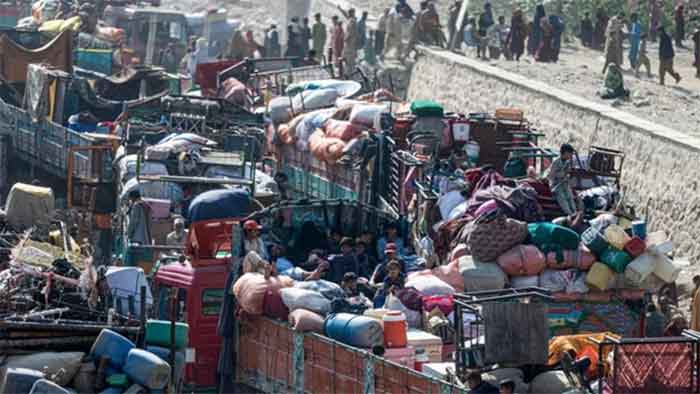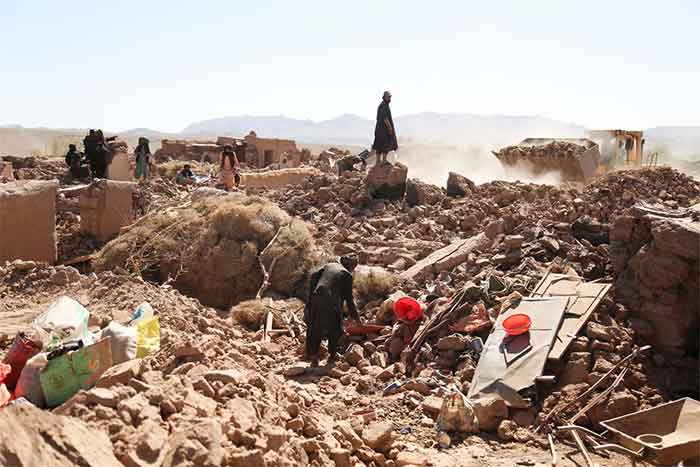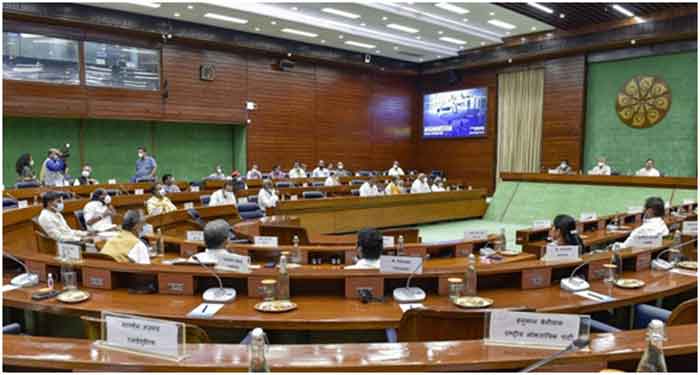
This is a review, in two parts, of some aspects of the All-Party Meeting on Afghanistan August 26, convened by the Modi-led Indian govt.
This Part-1deals with India’s foreign policy on the Afghan question.
Part-2 will discuss some other aspects, of evacuation, of domestic politics etc.
It was stated by the Govt that evacuating Indian personnel from the country is the “top priority” as the situation remains “critical” since the Taliban takeover…“ We have undertaken evacuation operations in extremely difficult conditions especially at the airport…Our immediate concern and task is evacuation and long term interest is the friendship for the Afghan people.
— Dr. S. Jaishankar (@DrSJaishankar) August 26, 2021”
After such initial remarks by Jaishankar, a formal presentation was made by foreign secretary Harsh Shringla. From the government side, the Union minister and leader of the house in Rajya Sabha Piyush Goyal and parliamentary affairs minister Pralhad Joshi also attended the meeting.
The parties were represented by their floor leaders that included, among others, by Congress leaders Adhir Ranjan Chowdhury, Mallikarjun Kharge and Anand Sharma; Nationalist Congress Party leader Sharad Pawar; Trinamool Congress leaders Saugata Roy and Sukhendu Shekhar Roy; former prime minister and Janata Dal (Secular) leader Deve Gowda; DMK MPs Tiruchi Siva and T.R. Baalu; Telangana Rashtra Samithi’s Nama Nageshwara Rao; Telugu Desam Party’s Jaydev Galla; CPI MP Binoy Viswam.
The 3.5 hours-long interaction, with 31 parties and 37 members, was a meeting full of inanities and half-truths, that concealed more than revealed what was going on:
“The message that we all want to give you is that on this matter, we have a similar view. We have a strong national position. The friendship with the Afghan people is something that matters to all of us. So we approach this situation in a manner of national unity,” the foreign minister told reporters after the meeting.
According to reports, Jaishankar told the political leaders that India was adopting a “wait and watch” policy, just like the rest of the world. He stated that the situation in Afghanistan continued to be critical.
The meeting took place 10 days after President Biden conceded defeat, the US puppet President Ashraf Ghani fled the country, Taliban took over Kabul on Aug 15, and declared the war had ended.
It was held shortly before a big explosion, a suicide attack claimed by IS-K (K stands for Khorasan region of Afghanistan, where its Hq is situated), took place that led to more than 170 deaths including 13 American army men.
Even that was not exactly a surprise because President had earlier named ISIS and said it was waiting in the outer Kabul zone, and a terrorist attack was imminent. That was why, he said, any postponement (beyond Aug 31) of US troops withdrawal was neither feasible nor advisable.
The sudden visit by CIA Director, William J. Burns, to Kabul on Aug 23 to meet Taliban chief Abdul Ghani Baradar, who had led Afghans in Qatar negotiations, was presumed to be linked with the unfolding events, including “ terrorist threats and the need for Taliban to help stop the Islamic state or others from mounting attacks …outside the Kabul airport, officials said.” (NYT Aug 24, 2021).
India has been closely associated with the US and Ghani for long years, had a huge diplomatic-military intelligence presence in and beyond Kabul with several Consulates.
In the event, where was the need for India, closely associated with US and Afghan admin, adopting a “wait and watch” policy? What was the meaning of this policy?
“Afghan ambassador to Washington Ms. Adela Raz said that President Ghani and his cronies simply emptied the Afghan Treasury and left with the loot…India’s policymakers couldn’t have been unaware that a cabal was ruling Afghanistan but deliberately chose to ignore it…”
India was more loyal than the king in its hostile policy toward Taliban even while the boss was taking help from the latter.
Delhi was fully aware of the unfolding developments, including the Burns trip to Kabul :
timesofindia.com, Aug 26, 2021, reported :
“Following details on recent developments in Afghanistan were shared by the ministry of external affairs with floor leaders of political parties in Parliament:
Pre-emptive measures:
• Temporary withdrawal of India-based personnel from our Consulates in Herat and Jalalabad in April 2020.
• Scale down of Embassy in Kabul: June 2021
• Evacuation from Kandahar: 10-11 July 2021
• Evacuation from Mazar-e-Sharif: 10-11 August 2021
• Series of security advisories issued.”
The above indicate that India was fully aware, weeks before, of unfolding developments that culminated in the collapse of the Ghani govt., and Taliban take-over of Kabul. That was inevitable as the US troops had vacated their barracks and left in July, even without properly informing the Afghan army Command, nor ground staff. They indicated the obvious.
There was no scope or need for India’s ‘wait and watch’ policy, but India adopted it. Why?
*** ***
“Delhi pinned high hopes on the US to rev up the great game in Afghanistan”
India is stuck up with its anti-Pak, anti-China policy, tied its hands and feet with the US, and went too far condemning Taliban even while US hobnobbed with the latter.
“The Washington Post has exposed that the Pentagon commanders lied and the ‘forever war’ continued… The disconcerting fact is, in India too, a determined lobby advocated the ‘forever war’ against all logic…
M K Bhadrakumar wrote the above lines earlier as Taliban took over Kabul.
He is a seasoned diplomat, India’s former Ambassador who had worked in Pakistan, Iran and Afghanistan, played a key role since 1990s in handling the Afghan Mujahideen, and who headed the Pakistan-Iran-Afghanistan desk at the Ministry Of External Affairs in the 1990s, and served the Indian Foreign Service for 29 years.
And he amplified as follows latest on Aug 28:
“ Delhi pinned high hopes on the US to rev up the great game in Afghanistan with an eye on Xinjiang and Pakistan, but, as it turned out, Washington dumped Delhi and began pursuing a renewed relationship with the Taliban. ..
“India is travelling in the Quad vehicle although that platform is a template of the US’ dual containment strategy toward China and Russia.”
“India should understand that the time for propaganda gimmicks is long past”
The western powers are being delusional that it is they who will determine Taliban’s “legitimacy”.
Not that India does not have its own inputs: After all India’s RAW was active in Afghanistan, and closely associated with CIA. And it has inputs from the other side too:
The Indian establishment media hyped up Prime Minister Narendra Modi’s call with Russian President Vladimir Putin on August 24 (two days before the all party meet), in a desperate attempt to distract attention from Delhi’s abject isolation over the Afghanistan situation…
“Whereas Delhi remains transfixed on the dated notions that the Taliban is only a Pakistani proxy, Moscow sees the Taliban as an authentic Afghan entity with a legitimate role to play in that country’s mainstream politics. Thus, engagement with the Taliban is a centrepiece of Russia’s Afghan policy today. ..
“Interestingly, Putin had a call with Pakistan Prime Minister Imran Khan regarding the Afghan situation only a day after his conversation with Modi. The Russian readout shows a high degree of convergence between Moscow and Islamabad on the way forward in Afghanistan.
“ The readout says both leaders “stressed the importance of maintaining peace and security” in Afghanistan, “preventing violence and establishing an inter-Afghan dialogue that would facilitate the formation of an inclusive government that takes into account the interests of all segments of the population.”
“ Putin and Imran Khan “agreed to coordinate approaches to the Afghan issue both in bilateral and multilateral formats” and to “use the capabilities of the Shanghai Cooperation Organisation in ensuring regional stability and the fight against terrorism and the drug threat.” (Bhadra Kumar)
Russia still supplies more than 60 percent (earlier it was 75 plus percent) of India’s defence supplies, and has been close to Delhi. Modi spoke to Putin, and India is formally associated with SCO too.
But India does not see the writing on the wall, even as Biden-led US conceded defeat in so many words. It is still subordinating its foreign policy to that of US.
And that is one major factor for the wait and watch policy.
*** ***
India as President of UN Security Council displayed its peevishness
India is the current President of UN Security Council, and seeks a permanent seat there. PM Modi addressed it too with lofty words. But its practice was peevish to say the least. These things were not discussed in the all Party meet.
The Taliban is literally ensuring that warlordism (“civil war”) is squashed before it takes root with support and financing from Ghani and covert encouragement from the US intelligence.
As indicated by the scale down of its Embassy in Kabul (June 2021), and evacuation from Kandahar (10-11 July 2021), India was clear of coming events, Pakistan having clear say and stakes there.
As early as August 9, 2021, i.e., one week before Kabul was taken over , Bhadra Kumar wrote in his blog, indianpunchline:
Referring to the “emergency meeting” of UNSC regarding Afghanistan that India convened on August 6 Friday, he wrote:
“India acted rather petulantly when it turned it down Pakistan’s request for participation in the meeting on Afghanistan. Alas, India made a clumsy start to its long-awaited UNSC presidency. This farcical performance does no credit to India’s claim for permanent membership of the UN Security Council…
“ This only leads to misperceptions that India is party to President Ashraf Ghani’s increasingly desperate fight for political survival… the will to fight for the survival of the Ghani government is fast dissipating, as the ruling elite in Kabul are seen by the Afghan people as inept, hopelessly corrupt and merely American puppets and time-servers.”
“India should summarily abandon its contrived narrative built on animus against Pakistan and recognise these new stirrings,” wrote Bhadra Kumar, the diplomat who had handled Pakistan, Afghanistan and its Mujahideen.
This anti-Pak mindset for a Modi regime that began its innings with a visit to Pakistan has been an albatross for any initiative for peace in the region, and is alienating India almost from all its neighbors. It is its own making, there is no use blaming China that is friendly to its own, the same, neighbors.
This animus against Pakistan is one more factor for India’s wait and watch policy. And that hurts India’s interests, security-wise and otherwise.
*** ***
India and its geoeconomics of tying itself with the US and its Pentagon
Foreign Minister Jaishankar stated, in an event of India’s Amritotsav ( 75 years of independence) on Aug 15, the day when Kabul was taken over by Taliban marking the end of US’ puppet regime of Ghani:
“While India’s interests converge with the US in the East, there are divergences in the West, particularly Afghanistan.” (Times of India, Aug 16,2021). The reference in the East was to QUAD, which he called “an important grouping in 21st Century” with its well known anti-China edge. He did not however amplify on divergences, he claimed.
He was eloquent on Modi’s initiatives in foreign policy: “ If you don’t give attention to your neighborhood, and your extended neighborhood, you are not seen as a serious player.”
The ground reality does not square up with his claims. The Afghan situation brought out India’s predicament as noted above. Tied to America’s hegemonist geo-politics marked by QUAD, India is losing in the realm of geo-economics too.
USA reportedly is contemplating sanctions on Afghanistan. Bhadra kumar wrote:
“ Yet another Chinese commentary this week entitled Afghan reconstruction may boost de-dollarization push …As the US seeks to impose sanctions against Afghanistan and stop much-needed global assistance to the country, the already-emerging global de-dollarization push could further accelerate with countries increasingly adopting alternatives to the US dollar… If Afghanistan’s reconstruction sets the stage for the increased presence and usage of other currencies like the euro and the yuan, the dollar’s status could be further diminished. In fact, the de-dollarization trend has already emerged in a number of countries and regions including Russia and Saudi Arabia.”
India tied to US and QUAD is missing if not shunning this trend of de-dollarization – adopted even by a brazenly pro-US Saudi – that would help face upto the economic crisis aggravated by Covid-19.
To be sure, the Taliban will not be cowed down by the threat of western sanctions. Taliban is riding a nationalistic wave. They want to avoid the entrapment of the 1990s. They are in discussion with China (and Pakistan, of course.).
Beijing is almost certain to provide a firewall for the Taliban government against Western pressures. Put differently, the US influence in Afghanistan has touched ground zero. But India is oblivious to this.
Modi spoke to Putin on Aug 24. The all party meet was held on Aug 26. But little is discussed about the serious issues involved therein. The real issues were not apparently explained to the meeting, which was filled with inanities and half truths.
“ Recent Chinese commentaries have flagged that “China’s close coordination and shared interests with Russia will also play a major role in potential rebuilding efforts in Afghanistan…
“ In the Afghanistan situation, China and Russia have maintained close communication and have shared interests in peace and development in Afghanistan, which makes the two countries the main players and partners in Afghanistan’s rebuilding efforts, in stark contrast to the US’ intention to sow chaos in the country…”
“Experts said that China and Russia are among the countries that most sincerely want peace and development in Afghanistan, even as the US and some other Western countries continue to seek to undermine that.”
Bhadra Kumar further wrote:
“ Its zero-sum mindset is obsessed with rolling back the influence of China and Pakistan, its archetypal enemies, in Afghanistan. Whereas, all serious regional states are approaching the Afghan situation, with a fulsome agenda of geoeconomics, especially Russia…
“ Modi’s call with Putin was a desperate attempt to mitigate India’s regional isolation. Putin understood and played his part, while sequestering Russia’s deepening ties with Pakistan.”
India claims it is interested in peace, friendship and development of Afghanistan. But what is the reality in practice? India still sides with US that is contemplating sanctions that would hurt Afghanistan.
Is this the national sentiment, and unity of approach toward Afghanistan as claimed in the all Party meet? And is it benefiting India’s economy? Obviously NOT:
India hitched its wagon to America’s New Cold War Policy, shifted from its “too close” relations with Trump to mending relations with Biden regime, indulged in its ant-China Covid-19 politics, gave a ‘Boycott China Goods’ call in the name of Swadeshi, and hoped it can benefit from Chinese setbacks in the wake of Cold War.
However, events did not turn the way it was hoped by US and India. Biden reportedly activated his efforts to revive economic relations with China; reportedly US lifted restrictions on certain exports of key components to China.
Despite India’s calls for Boycott, trade with China went up
That is so in the first half of 2021. India’s commerce minister, in a written reply, in Rajya sabha on Aug 6 stated that. PTI reported India’s exports went up to $ 21.19 billion in 2020-01 from 16.61 of 2019-20; imports from China remained unchanged around 65.21. As a result, India’s trade deficit declined to $ 44 billion in 2020-01 from 53.57 in 2018-19. All this is despite global slow-down, and supply chain problems post-Covid, it was stated separately.
India’s bilateral trade with China in the first half of 2021 crossed $ 57 billion, grew 62 percent in first half of the year, PTI had reported earlier on July 14, 2021. China had emerged as India’s biggest trade partner, overtaking the USA, in 2020, the two-way trading being around $ 77.7 billion (US trade was 75.9) , Bloomberg reported Feb 23,2021. It was lower than 85.5 the previous year, but needs to be seen in the context of Covid downturn. And despite Galwan clash and Boycott calls in mid-2020.
While US played protectionism even against India, its junior partner and QUAD ally, China imported more, bringing down India’s trade deficit.
The message is clear, and the potential is clearer, if only India shed its hostile policy.
“The rise of power starts at home,” Jaishankar said and claimed “ a lot of progress in the last 7 years is very visible at home.” “We aspire to bigger things,” and mentioned India’s development strides, and said: “that is how countries like China grew and developed.”
But still India prefers to go with US-led QUAD directed against China. “Interests converge with the US in the East” said Jaishankar. The question is whose interests? It may benefit US and some cronies, but definitely not India’s.
Developments post-Afghanistan brought out the issues involved in geo-economics. India had lot of business stakes, and around 500 ongoing projects in Afghanistan, expressed its continued interest in its development, but its practice is not according with its professions.
Fact is, most of the projects were linked with US war and strategic interests that now need to be reviewed and re-oriented to suit Afghan people’s interests. And that is where geo-economics favor India, but only if only it gives up its subservience to US which is suicidal.
India apparently has not learnt its lessons. Defence Minister Rajnath Singh on Aug 29 said: “The changing equation in Afghanistan is a challenge for us…These situations forced our country to rethink its strategy. We are changing our strategy and the formation of QUAD underlines this strategy….seriously considering the formation of Integrated Battle Groups.”
Changing equation …but no change in policy.
Jaishankar reportedly spoke, Aug 28, to US secretary of State Antony Blinken, who said “spoke with Jaishankar today to discuss our shared priorities including continued coordination on Afghanistan.”
US spokesperson Ned Price amplified: they “ agreed to remain closely coordinated on shared goals and priorities to deepen the US-India partnership.” (indiatoday.in, Aug 29).
What is the “rethink in strategy”? Continuing with the same QUAD! And close co-ordination with US on Afghanistan. Sink together with US! And form Integrated Battle Groups? Does it mean stepping into the shoes of US troops that fled, and doing their bidding?
Does it help the people, peace and development of Afghanistan, or aid merchants of death, the Pentagon, and its compradors? The answer is obvious.
Is this what India’s “united approach” on Afghanistan claimed in the all Party meet?
India celebrates Amrit Mahotsav (75 years) of its independence, mouths Swadeshi and Made in India, but its foreign and Defence policies are made in and subordinated to USA.
It is sham nationalism, Hindutva-linked rather than anti-imperialist, that is guiding Modi-led India. It hurts India and its people.
*** ***
Is India’s “wait and watch” policy, “just like the rest of the world”?
According to reports, Jaishankar told the political leaders that India was adopting a “wait and watch” policy, just like the rest of the world.
Jaishankar tweeted that he had briefed the floor leaders of all political parties regarding the situation in Afghanistan: “There is longstanding national sentiment on Afghanistan. Therefore, there is national concern now at developments,” Jaishankar said.
“The message that we all want to give you is that on this matter, we have a similar view. We have a strong national position. The friendship with the Afghan people is something that matters to all of us. So we approach this situation in a manner of national unity,” the foreign minister told reporters after the meeting.
With not a single good word for the Afghan people who saw their occupationist US force thrown out; and siding with the aggressor, how can Delhi claim that “friendship with the Afghan people is something that matters to all of us” ?
No it is a clear case of manufacturing consent in favor of the US super power.
“So we approach this situation in a manner of national unity,” he said. No detailed reports are made available about views expressed if any by the parties that attended.
Some members reportedly questioned Modi’s absence in the meeting called at the suggestion of PM himself. He who had a latest talk with Putin was not there, to report about it.
The meeting was told of PM Modi’s conversations with Putin and German Chancellor Angela Merkel, but no details were given.
Everyone knows Russia has been actively engaged with Taliban. And before the all party meet agencies reported of German stand.
Merkel had said on Aug 25: “ One thing is clear. The Taliban are now a reality in Afghanistan.” She was addressing the German lawmakers. “International community must have talks with Taliban” (German Agency aa.com)
Germany had evacuated over 4850 people with no serious problems. America had evacuated more than one lakh people. Taliban created no hurdles. But the Govt in the all party meet created a different, prejudiced impression.
The NATO is no more one on Afghanistan. There are some seeking strategic autonomy:
European Council President Charles Michel following the G7 leaders’ meeting marked a difference. Significantly, the statement concludes by flagging the lessons “to draw from what happened in Afghanistan. These events show, that developing our strategic autonomy, while keeping our alliances as strong as ever, is of the utmost importance, for the future of Europe.”
Even Shiite powers Iran, PLO, Hamas and Hezbollah, all anti-‘Sunni Taliban,’ had all welcomed and greeted the Taliban take over. Even pro-US Saudi Arabia had said it would respect the will of the people. Oman said it was a victory against foreign aggressors. Khatar and Kuwait hoped for a peaceful transfer of power.
Is India’s “wait and watch” policy, “just like the rest of the world”? Or sailing and sinking with the US?
*** ***
Blaming so-called Pakistan-China axis so as to serve US and QUAD
The Govt informed the all party meet about its Afghan diplomacy, and of its role in UN SC of which India was the current President.
That being so blaming so-called Pakistan-China axis, and their sympathizing with terrorist Taliban is meaningless.
China categorically told the UN Security Council on Aug 16 :
“Afghanistan must never again become a haven for terrorists. This is the bottom line that must be held firmly for any future political solution..we hope that Taliban will earnestly deliver on their commitments and make a clean break with terrorist organizations…
“All countries should fulfil their obligations in accordance with international law and Security Council resolutions, work with each other in combating terrorism in all its forms and manifestations, and take resolute actions to prevent terrorist organisations such as the Islamic State, al-Qaida and the ETIM from taking advantage of this chaos (in Afghanistan).” (PTI)
China’s spokesperson noted that the Afghan Taliban said ( on Aug 15 Sunday) that the war in Afghanistan is over and that they will hold talks aimed at “forming an open, inclusive Islamic government in Afghanistan and take responsible actions to protect the safety of Afghan citizens and foreign diplomatic missions .”
“China respects the Afghan people’s right to decide on their own future independently. China is ready to continue to develop good-neighbourliness and friendly cooperation with Afghanistan and play a constructive role in Afghanistan’s peace and reconstruction.” “
On Aug 23, three days before the all Party meet, the Chinese Foreign Ministry expressed the hope that “Afghanistan will form an open, inclusive, and broadly representative government, adopt moderate and prudent domestic and foreign policies and conform to the aspiration of its people and the common expectation of the international community.”
India and its agencies continued their calumny against China, Pakistan and their so-called axis that favored terrorists, Taliban included.
Unlike al-Qaida, ISIS, and some others the Afghan Talibans are NOT specifically listed on any UN sanctions list, reports indicate. The UNSC has dropped the Taliban reference from a paragraph in its statement on Kabul blasts that called on Afghan groups not to support terrorists“ operating on the territory of any other country” (NDTV, Aug 29,2021) Biden himself is seeking help of Taliban in countering terrorists in Afghanistan.
What does Beijing want? Hu Xijin, the influential editor-in-chief of Global Times has written: “First, they (Taliban) draw a clear line against the East Turkestan Islamic Movement (ETIM) and other terrorist forces that pursue ‘Xinjiang independence,’ and they do not support any activities aimed at destabilising China’s Xinjiang Uygur Autonomous Region.
“Second, they form an open, inclusive and broadly representative government, bringing a complete end to the civil strife for a permanent peace. They should also contribute to ease the regional situation and promote the well-being of the Afghan people, providing no more pretexts for possible future interventions by outside forces.
“Third, they keep distance from the US and other forces that turn out to be hostile to China. They should refuse to act as a pawn for those forces to jeopardise China’s strategic interests. Instead, we hope they are committed to developing friendly and cooperative relations with China and other neighbouring countries and integrating into the common cause of regional peace and development.
“Fourth, they promote the moderation of basic domestic social policies, boost the development of human rights, protect the rights of women and children, and turn Afghanistan into a moderate Islamic country.” read more
Thus it is in China’s own interest to oppose terrorism, and strive for regional peace; it is opposed to US hegemonism, and not inimical to India. It is India that is for its QUAD alliance that is against China.
*** ***
“India should not indulge in a “widow’s wail” as if Pakistan has taken over Afghanistan”
Govt projected as if there is complete unity on its Afghan policy, that is pro-US and anti-Taliban.
The Govt told the meeting that “Taliban reneged on its commitments” made in Doha (Feb 2020). Thus its revealed its prejudice and anti-Taliban mindset.
But that was not objective situation as can be seen by detailed appraisals by Bhadra Kumar, seasoned diplomat and expert on the subject who had handled the Mujahideen.
Experts felt it was the Afghan regime that ditched the deal, as evident from President Ghani’s fleeing without notice. He claimed it was to avoid blood bath, but the Doha negotiating team was “surprised,” as were others involved, including American diplomats, even his Chief of staff and other top aides. (Bloomberg Aug 17,2021, cited by NDTV.)
There is no unity on the Afghan policy as claimed by the Govt. See below:
India should be “open-minded” about dealing with the Taliban, said Yashwant Sinha, as reported by PTI, Aug 19,2021:
Sinha is Former External Affairs Minister, then a BJP leader who was in Vajpayee cabinet. He said on Aug 17 that India should be “open-minded” about dealing with the Taliban and suggested that it should open its embassy in Kabul and send back the ambassador…
As a big country, India should approach the issues of the Taliban with a degree of confidence and should not indulge in a “widow’s wail” as if Pakistan has taken over Afghanistan or has an advantage over it, he added.
Mr. Sinha said in an interview that the Indian Government should not conclude that the Taliban will place itself “in Pakistan’s lap” as every country furthers its own interests.
“It appears on the face of it that the Taliban of 2021 is not the same Taliban of 2001… they should not be dismissed off-hand because of their past behaviour. We have to look at present and future,” he added.
He said India should have waited instead of immediately closing its embassy and evacuating its people after the extremist Islamist organisation captured Kabul.
India on Aug 17 Tuesday rushed back home its Ambassador Rudrendra Tandon and staff from the embassy in Kabul in a military transport aircraft.. after Taliban seized the Afghan capital on Aug 15.
“ This policy needs to have a second look,” Mr. Sinha said, noting that the Taliban is holding talks with former Afghanistan President Hamid Karzai, and others like Abdullah Abdullah. It could not have been imagined earlier, Mr. Sinha said.
He added, “India should immediately open its embassy in Kabul and send back the Ambassador.”
Sinha became a critic of the Narendra Modi government and quit the BJP. He is currently Vice-President in the Trinamool Congress, the ruling party in the major state of Bengal.
To dismiss always is to turn your face from reality, he said: “We must remember that the people of Afghanistan have great love for India.”
But Sinha should realize Modi-led India has “greater love” for US. Govt did not take a stand independent of US policy.
For Sinha’s interview, visit:
There was no unity in approach as claimed by the govt. For instance Communist Party of India (Marxist) and Communist Party of India have issued a joint statement on August 18, which among other things said:
“THE United States has suffered a humiliating defeat in Afghanistan. Twenty years after the toppling of the then Taliban regime, the Taliban are back in power. ..The Afghan policy of the Indian government had been blindly following the Americans and this had resulted in its isolation in the region and is hence left with few options…
“The international community’s concern that Afghanistan should not become a haven for terrorist groups like the Islamic State and the Al Qaeda was collectively expressed by the United Nations Security Council in its emergency meeting on Afghanistan on August 16.
“India must work closely with major regional powers to see that the Afghan people are able to live in a peaceful and stable environment. Indian government should immediately work towards safe evacuation of all stranded Indian citizens in Afghanistan.”
Apparently the Govt, in the all party meet, had NOT given any opportunity to various parties to state their stand. It was a 3.5 hours meet where 37 leaders of 31 parties were lectured by the representatives of the Govt.
the newindianexpress.com reported after the All party meet:
CPI MP Binoy Viswam said Jaishankar “patiently heard and addressed every question”. How are the answers? “But the government’s policy seems to be not to divulge any details. To questions on how many Indians were left and how we are ensuring their protection, the minister did not have any answer. Many critical questions were unanswered,” he said.
“ Left leaders like CPI(M)’s P.R. Natarajan questioned whether the US had kept India in the loop when it decided to advance the withdrawal of American forces from Afghanistan, ” it was reported. But no clarification was reported.
*** ***
To sum up:
India’s Afghan Policy is subservient to the super power strategic interests of US; therefore it does not contribute to peace, regional or global.
It weakens and isolates India in the region and the world; it is not a united approach within India and cannot unite Indian people behind it.
It does not help India or its people, not to speak of Afghan people.
India should give up this policy and must adopt an independent foreign policy that serves India’s interests. People should press the Govt for the same.
***
(Part-2 will discuss some other aspects, of evacuation, of domestic politics etc.)
(Author was a media person)

